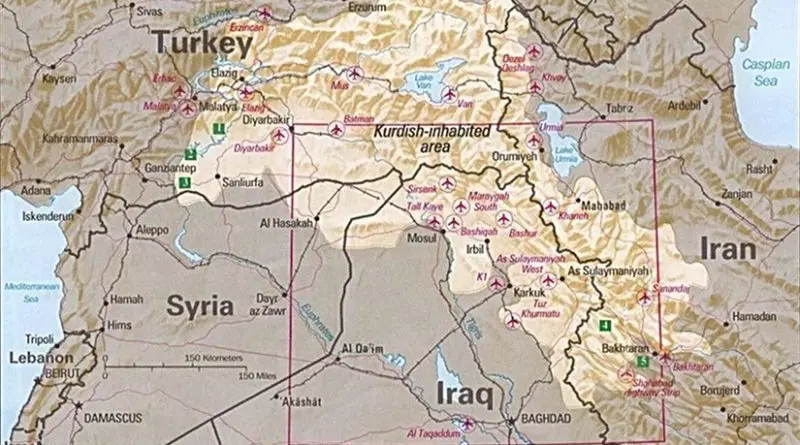Muzzling Of Kurds: Why Recent Uprisings Will Fail To Compel Regions Largest Diaspora – OpEd
For nearly five months, the fervent revolt of the Arab street in the thirst for democratic aspiration has had monumental results. Two tyrants have been brought down, one seems to have done a bunk, and three others are seemingly on their last legs whilst confronting the anger of their long aggrieved populaces.
But what is surprising about the spiraling antagonism vented against most rulers of the Arab world, is the apparent silence of one of the regions most persecuted ethnic groups: The Kurds.
They number upwards of 25 million. They are an indigenous people, complete with their own language and tradition, and spread across geo-cultural mountain lands (which they call Kurdistan) and today encompassed by modern Iran, Iraq, Turkey and Syria. The story of the Kurds is a potentially rich but often poignant one; they have long suffered decades of ill-treatment and brutalization by some of their neighbors.
But one should not forget that in the quest for Kurdish separatism, the Kurds too have indulged in some of the most horrific terrorist and cold-blooded atrocities.
As a natural part of the landscape they are tolerated. But it’s their dreams of an independent state, one that entails breaking up the prevailing makeup of four countries; that leads their hosts to increasingly become weary of them. They are seen as something akin to a bone in the throat- one that can neither be swallowed nor thrown out.
So why not take to the streets and revolt en masse, albeit violently, like their regional counterparts for democratic aspirations?
The truth is always relative. The uprisings of the Arab streets are uprisings for democratic participation, freedom, human rights and the rule of law. Kurdish participation will quickly become synonymous with adventures for an independent homeland. Simply put, that is too big a bite.
Syria, being the first autocratic regime with a Kurdish minority to be confronted with popular upheaval, leaving the former Iraq aside, quickly spelt out the rules. At the first sign of dissent, which is now continuing at deadly pace, it acquiesced to long Kurdish demands for a basic right: Citizenship. And so, for the first time since 1962 ten percent of Syria’s population, whom are Kurds, have now been granted the rights of Syrian nationality.
Syria’s neighbor Turkey, home to the largest concentration of Kurdish people, bestowed them this right since day one. But many restrictions, like officially speaking the Kurdish language- not to mention others, remain.
But the Kurds are patient kin.
In recent times, the end of the first Gulf War triggered a revolt, along with their long oppressed Shiite counterparts in Southern Iraq.
But after been gassed a few years earlier, and sensing defeat at Saddam’s hands again, they ran, scurried and fled into the mountain wilderness.
Although relative success was garnered in post-Saddam Iraq, the delicate and fragile autonomy can collapse the minute the Kurds dare make a declaration for independence. The countries Arabs, Sunni and Shia, are sure to pounce on their dreams of statehood. Many of the Kurd populated areas in Iraq are rich in oil, freeing it from independent Iraqi government control -will render the rest of the country bankrupt.
The Kurds are on dangerous ground.
If they’ve learnt one thing from their Arab, Turkish and to an extent Persian neighbors, it is that incorporating the demand for Kurdish autonomy via a campaign of militancy, is going to get them nowhere. Their numbers might swell the ranks of the popular masses in revolt, but not at the risk of breaking up the state.
For all the rhetoric of democratic revolt, the so-called Arab spring is exactly what it spells: An ‘Arab spring’.
The Kurds are left with perhaps only one wise solution. They are aware that they highly outgunned, outnumbered, and that their potential for a repeat of the type of limited autonomy enjoyed in Iraq after a long and arduous struggle, can be only be realized in a conflict they are on the sidelines of. Although stability is not a popular aspirant for a breakaway state; the blowing wind of conflict and its aftermath, maybe the only road to which they can cling for hope on.
Skirmishes in Kurd areas of the Middle East aside, the everyday Kurd has only time as his companion. The struggle for belonging, for equality and peace is something which they should be resigned to believe will not come by insurrection from within the nations that they have become default inhabitants. Their spring can never be an Arab-street inspired one, it needs a unique dimension: A Kurdish one.
The writer a PhD candidate in Political Violence at the department of Middle East & Mediterranean Studies, King’s College London.

